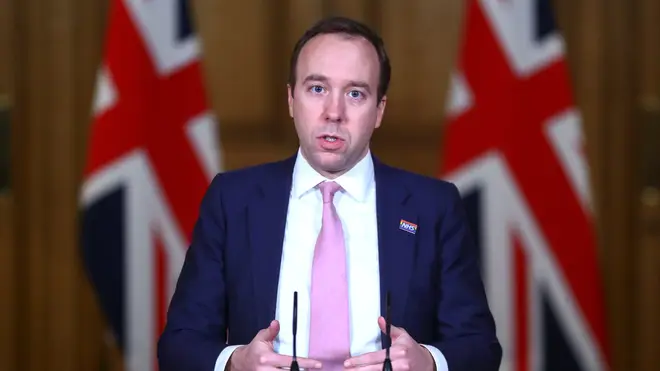
Paul Brand 4pm - 7pm
18 January 2021, 17:42 | Updated: 18 January 2021, 20:49

The public should not "blow it now" by failing to follow the rules, the Health Secretary said today as he confirmed over four million people in the UK have received the first dose of a Covid vaccine.
The Health Secretary hailed the speed at which the jab has been rolled out across the UK but said that disregarding the rules now could significantly worsen the situation.
At a Downing Street press conference on Monday, he assured the over-80s who have not yet been invited for a vaccine that they would get their first dose in the next four weeks.
Read more: 24/7 Covid vaccine clinics to be piloted within weeks, minister tells LBC
Read more: Rapid vaccine rollout could see lockdown start to be lifted in March, minister says
"Don't blow it now. We're on the route out. We're protecting the most vulnerable. We're getting the virus under control," he said.
"Together, I know that we can do it and we've got to stick at it - especially without plans for all adults in the UK to be offered a Covid vaccine by September."

Over 4 million people have been vaccinated in the UK
Government data for January 17 shows that 4,514,602 jabs have been given in the UK so far - 4,062,501 of them first doses.
Despite concerns the Government may not meet its targets, Mr Hancock said it was well on its way to meeting its promise.
The UK is now vaccinating at "more than double the rate" of any other country, he added.
Read more: Over 70s and clinically vulnerable to be invited for Covid jabs
Professor Stephen Powis told a Downing Street press conference on Monday that around 15,000 people had been admitted to hospitals with coronavirus since Christmas Eve.
In recent weeks one person has been admitted every 30 seconds.

NHS is under significant pressure 'in all parts of the country'
Professor Powis said: "It is absolutely critical that we continue to stick to those social distancing rules that are in place. That we don't rely yet on vaccines coming to our rescue.
"It will be some time before the effects of the vaccination programme are seen through into reducing pressure on hospitals. We all have a role to play in reducing the risk of transmission."
Asked what should happen when the most vulnerable receive their vaccines, Mr Hancock said there should be a "national debate" on which groups should be prioritised.
Read more: Travel corridors closed in effort to curb Covid-19 case numbers
"After that it is essentially about protecting people as well as possible according to essentially a judgment about who should come next," he told a No 10 news conference.
"That is why I think we should have a debate about it. After that, it is really about protecting against transmission and making sure that we can get life back to normal as soon as possible."

Vaccine Minister explains how many jabs are being made in the UK
Asked to confirm whether restrictions will start to be lifted and schools will reopen in early March, Mr Hancock said: "We've got to watch the data and the Prime Minister, when he brought in the national lockdown, set out four considerations.
"We've got to see the number of deaths coming down and, sadly, we haven't seen that yet, we need to clearly see the pressure on the NHS reducing and, as you've just heard from Professor Powis, we are not seeing that yet.
"We must see the vaccination programme working and the rollout is going really well, so that is clearly on track but it's still got a massive effort, and we need to see the efficacy of the vaccine working in practice saving lives, which we know that it will from the clinical trials but I want to see that actually happening on the ground.
Read more: Carer 'delighted' he was given Covid jab with elderly father
"The fourth consideration is that there isn't some other new variant in the same way that in December we discovered the new variant that caused so many difficulties and meant that the old three-tiered system ceased to work.
"We monitor all the time for new variants and, as you know, we've taken very significant and rapid action to protect Britain from new variants that are spotted overseas."